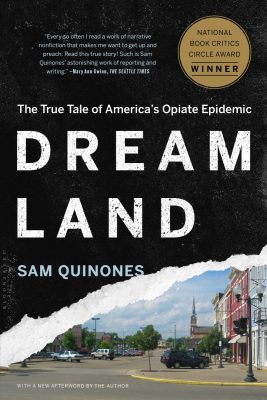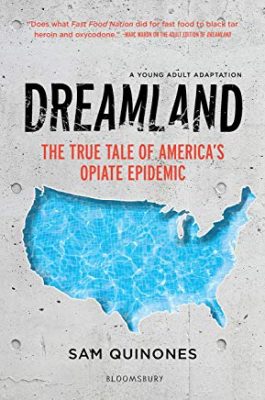Four years ago today, April 15, Dreamland was released after a lot of work, interviews, travel, and endless revisions.
At the time, my family and I thought the book would fail and fade quickly because throughout my research I found people – families mostly – very reluctant to talk. This issue remained largely hidden, though I judged it to be the country’s worst drug scourge.

But those families were ashamed, mortified that loved ones were addicted, and thus they kept silent.
In the four years since Dreamland came out, I’ve been thrilled to watch awareness of the problem spread, and the response to the book grow every year more intense.
Media outlets now devote large pieces to it.
Families now speak publicly about it, instead of staying in the shadows. Their obituaries are more likely nowadays to tell the truth. That’s healthy for those families, and for the country.
Politicians have expanded budgets and enacted new policies to fight this problem.
Opiate addiction is now recognized as one of the top issues facing the country, which is where it should always have been.
When I was writing Dreamland, there were three lawsuits against drug companies. Today, there are some two thousand plaintiffs: counties, towns, Native tribes, Attorneys General, and more.
So I wanted to take a moment to thank all of you who have read Dreamland, who’ve passed it around, read it for book groups or in classes, gave it as gifts, pestered co-workers to read it, and talked about it endlessly.
Thanks, too, to elected officials who have used it to shape policy, doctors who’ve used the book to inform their practices, families who’ve gone public, and podcasters for sharing it.
As I’ve spoken all over this country — more than 200 times since the book came out — I’ve realized how important word-of-mouth has been.
I have cherished the chance to speak to so many kinds of groups: public health nurses, judges, drug counselors, coroners, librarians, doctors, legislators. And more.
I’ve especially loved the chance to visit small towns where I assume authors don’t often show up: Tiffin, Bluffton, Leadville, Hendersonville, Whitewater, Whitehall, Marion, Peoria, Van Wert, Springfield, Newark, York, Worchester, Jeffersonville, Chico, Morehead, Mishiwaka, Spartanburg, Simi Valley, Greensboro, Scottsburg, Chillicothe, Grosse Pointe, Ashtabula, Marysville, and others.
I want to thank all the folks who helped me with the book when they didn’t have a clue who I was. Especially the good people of Portsmouth, Ohio, where I kept on showing up to listen to stories of pill mills, of a beloved swimming pool, and finally, of recovery.
There’s still a long way to go in all this.
The numbers of deaths remain staggeringly high. Each one reflects crushed families and friends. I think a lot about them as I’m on the road. I meet them everywhere, though I often don’t know what to say, or whether what I say is of any help. So I tend to do a lot of hugging.
One crucial issue is convincing insurance companies to reimburse for pain treatment that does not involve opioid painkillers. This would allow doctors to fashion a more holistic array of treatment for chronic-pain patients, instead of just cutting them off from the pills and forcing them, cruelly, into the black market.

A Young Adult version of Dreamland will come out this summer, which I hope will allow high school teachers to guide students in understanding, discussing, and, who knows, taking action in their communities.
I’m working now on a follow up to Dreamland, which will chart the epidemic and all that’s happened surrounding it in the last several years.
All that is to come.
For now, I’m shaking my head at the long amazing trip that Dreamland has been so far, and my family and I thank all of you who read it for allowing the book to play a role in our national story and yours.



I spent a long time reading this book, almost a full year (along with dozens of others through that time) because I didn’t want the book to end. Now I own two copies.
What the book is about is something that has never directly touched or affected my life, personally. But that is a testament to the book’s power. You don’t even have to relate, to be swept into its compelling narrative.
I love the book as if I’d been waiting all my life to read it. I have recommended it to almost every true reader I know.
This book is a story of my time, and it is a story of America. It is a story woven so deeply within the heart of what America is, what it has become, and the incredible humanity, along with the obvious mix of frailty and strength – that is the honest and most faithful reality and expression of the nation.
Which is why it is a story you never want to end. And yet in many ways the book itself is a brave new beginning. Of something more than just information and awareness. The courage to face a truth and fight back against a thing that is often faced alone, and is always larger and more powerful than that single person who has to face it: addiction.
Which is why we all need each other, whether we like it or not, and whether we can admit it or not.
Which is of course, what the book is really all about.
Which is why I love it to bits. Drawn to a warmth that always succeeded to draw me in, and never repelled me in any way, although the tell it tells is not sweet.
Thanks for all of that, Sam.
I’m impatiently awaiting the next book, you know. You just don’t write enough of them.
Hi Sam, Warmest congratulations. You know I am one of your biggest fans ever since reading your TRUE TALES OF ANOTHER MEXICO. I recognized at once how important DREAMLAND is, and I gave copies to friends and colleagues and urged them to read it. And I still do.
thanks so much CM. i hope all’s well. working on the follow to Dreamland now. a lot of work but getting it done. hope you’re well.
Wouls love to see a more indepth book on the Xalisco Boys and the criminal organization as a whole. Who they are now, etc. Loved your book, but I must admit I skipped passed everything to do with the medicial side and just read everything to do with the Xalisco Boy organization.
Growing up in a coastal community of southern California in the 1970-80s, Opiates were not the drug of choice. Many learned about Heroin’s addiction through stories and movies that romanticized the habit. Today, I’m grateful to be a member of AA and often hear about those who are duel addicted. The rooms of AA are filled with young drug-addicted adults spilling from the many popular rehab facilities located in this community. Narcan now seems to go hand in hand with addiction and overdose. Thank you for persevering, we will hear you speak locally in April.
Sam,
I’ve been recovering from addictions to drugs since 1984. Growing up in the 60’s, I progressed through the usual assortment of substances and was addicted to heroin, methadone, and alcohol before getting help. Many of my peers have died or ended up in jail. Your writing shows a keen grasp of how opiates engulf the user in a deadly pleasure/pain cycle which almost inevitably results in a tragic ending. When I stopped using I never anticipated the coming epidemic brought on by the Mexican suppliers and the bad actors in the pharmaceutical industry. Thank you for telling this story in such an insightful and sensitive way.
I went to elementary school and high school with David. I just ordered your book. I expect it to be even more of an eye opener for me but maybe not a surprise… Ty in advance.
You have written an incredible book, Sam. One that guides the unbelieving into something better and far more necessary. Belief, of course, but understanding why.
I came upon it because another author writing on the same issue, mentioned it.
And I couldn’t put it down. Compelling, honest, informative, and reeking of humanity.
But hell, this isn’t a book review, or at least, wasn’t intended to be.
Watching a fair number of your talks, interviews and other discussions online, it has struck me that the most fascinating and important part of this issue is linking it to the bigger picture – that deep pain that now resides in America. That is where the larger story resides. So it opens up a box of sorts, Pandora’s or otherwise…
A pleasure to commend you on a work well done.
For the long haul,
Jp
thanks so much. really nice of you to take the time to write, and I’m so glad you liked Dreamland!
Mr. Quinones: I hope your future will include speaking to/with school children in whatever grades you believe to be the best. With all children “growing up” beyond their years, it is, perhaps, never too early. Thank you for taking the time and being concerned enough to write as you did. I am reading Dream Land now, for our book club comprised of adult women, most of whom have children. My best wishes for you. Blessings now and always.
Congratulations on your book anniversary and the mark it has made on educating the public about addiction.
This book pulls everything together concerning the Opioid epidemic facing this country and makes sense of it. Hats off!!
I just read Dreamland over spring break – done in two days! Fascinating, heartbreaking and so well written! I am so excited that you are coming out with a YA version as I am a high school teacher who would LOVE to use this in my curriculum. Is there a way to get on a mailing list about that version or just check Amazon frequently?!
I will get back to you on that…..thanks for asking.
Congratulations Sam.
Dreamland has been a major factor in raising awareness. You should be proud of that and you deserve all the praise that has accompanied your book.
I am so proud of the small part I got to play in this book. Thank you for all you have done to shine a light on the problem and the solution
Sam, Congratulations! You know I have been a huge fan of your work since your two books of essays on Mexico, published before DREAMLAND. I still tell anyone and everyone, whenever the subject of the drug trade comes up, that they must read DREAMLAND. No one else could have written this story so well as you did– for it required the in-depth knowledge and experience of your previous reporting on Mexico. I look forward to your next work. Viva!
I am happy to learn of a young adult version is being released. I have also recommended the ECONTALK podcast interview as way to lead people to the book. I fear this book and story will remain relevant for years to come.
I thank you for the extensive research you did. I found it informative and empowering to spread the word.
Sam: We lost our son, William, to an accidental heroin poisoning in December of 2012. He was just 24. Nearly six years ago now I wrote an Op-Ed about our story, his story. It evoked stories then and continues to do so now when I share it. Families ARE becoming more open. Like onion skin, stigma ever so slowly sheds away, thanks in large measure to Dreamland. You can read my essay here: https://parenting.blogs.nytimes.com/author/bill-williams/